英语易混词辨析
英语易混淆单词辨析
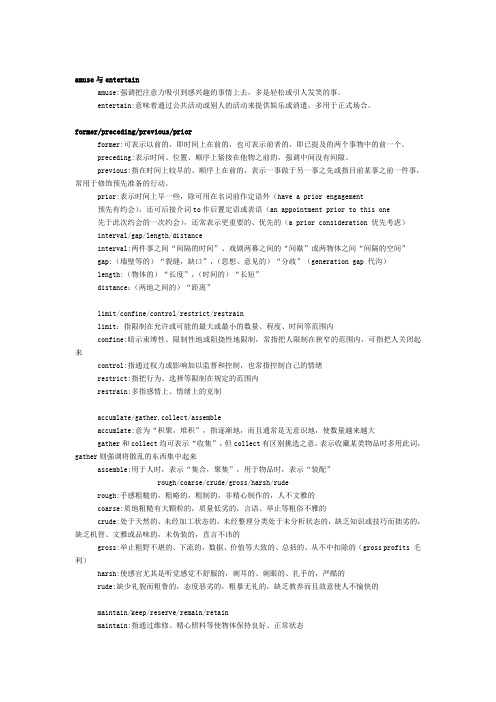
amuse与entertainamuse:强调把注意力吸引到感兴趣的事情上去,多是轻松或引人发笑的事。
entertain:意味着通过公共活动或别人的活动来提供娱乐或消遣,多用于正式场合。
former/preceding/previous/priorformer:可表示以前的,即时间上在前的,也可表示前者的,即已提及的两个事物中的前一个。
preceding:表示时间、位置、顺序上紧接在他物之前的,强调中间没有间隙。
previous:指在时间上较早的、顺序上在前的,表示一事做于另一事之先或指目前某事之前一件事,常用于修饰预先准备的行动。
prior:表示时间上早一些,除可用在名词前作定语外(have a prior engagement 预先有约会),还可后接介词to作后置定语或表语(an appointment prior to this one先于此次约会的一次约会),还常表示更重要的、优先的(a prior consideration 优先考虑)interval/gap/length/distanceinterval:两件事之间“间隔的时间”、戏剧两幕之间的“间歇”或两物体之间“间隔的空间”gap:(墙壁等的)“裂缝,缺口”,(思想、意见的)“分歧”(generation gap 代沟)length:(物体的)“长度”,(时间的)“长短”distance:(两地之间的)“距离”limit/confine/control/restrict/restrainlimit:指限制在允许或可能的最大或最小的数量、程度、时间等范围内confine:暗示束缚性、限制性地或阻挠性地限制,常指把人限制在狭窄的范围内,可指把人关闭起来control:指通过权力或影响加以监督和控制,也常指控制自己的情绪restrict:指把行为、选择等限制在规定的范围内restrain:多指感情上、情绪上的克制accumlate/gather,collect/assembleaccumlate:意为“积聚,堆积”,指逐渐地,而且通常是无意识地,使数量越来越大gather和collect均可表示“收集”,但collect有区别挑选之意,表示收藏某类物品时多用此词,gather则强调将散乱的东西集中起来assemble:用于人时,表示“集合,聚集”,用于物品时,表示“装配”rough/coarse/crude/gross/harsh/ruderough:手感粗糙的,粗略的,粗制的,非精心制作的,人不文雅的coarse:质地粗糙有大颗粒的,质量低劣的,言语、举止等粗俗不雅的crude:处于天然的、未经加工状态的,未经整理分类处于未分析状态的,缺乏知识或技巧而拙劣的,缺乏机智、文雅或品味的,未伪装的,直言不讳的gross:举止粗野不堪的、下流的,数据、价值等大致的、总括的、从不中扣除的(gross profits 毛利)harsh:使感官尤其是听觉感觉不舒服的,刺耳的、刺眼的、扎手的,严酷的rude:缺少礼貌而粗鲁的,态度恶劣的,粗暴无礼的,缺乏教养而且故意使人不愉快的maintain/keep/reserve/remain/retainmaintain:指通过维修、精心照料等使物体保持良好、正常状态keep:指通过主观控制使某种状态维持下去或某事物维持原状reserve:指为了某特殊目的而留出或保留,强调继续保持以备后用,可指保留意见、权利或力量等 remain:指继续某种状态、依然不变,还可指停留、留下以及剩下retain:表示保持、继续拥有一直拥有、原来拥有的东西sense/meaning/significancesense:常指词的各种不同解释,表示一词可有一个以上的意思,文章可有多层含义等,也指较为含蓄的意义,只有认真领会才能知晓meaning:含义较广,可指字面意义或隐含意义,还可指动机、目标、后果等significance:较正式,指赋予语言、行动、事件等的特殊、深层的意义instruct/teach/educateinstruct:在一定学科或领域内有条理地教授或指导必要的知识或技能teach:任何直接传授知识或技巧的行为educate:正式的系统的学校教育,也可指对人在某方面进行培养opportunity/chance/occasionopportunity:机会,时机,表示符合自己想干某事的意思、目的、雄心的时机,如:to grasp opportunity forbroader experience when it appears(抓住获得更丰富经历的机会)chance:机会,可能性,表示运气或偶然的时机、因为运气或偶然而出现的机遇,如:You still have the chance ofcatching the train.(你仍然有机会可能赶上火车)occasion:时机,场合,表示特定的时刻、场合,指能激发或唤起某人某种行为的适宜时间和地点,如:This is not an occasionfor laughter.(这种场合笑是不合时宜的)identical/same/equal/equivalent/similaridentical:可与same表达相同意思,指同一事物或人,指几个事物相同时,该词强调在各方面包括细节上完全一样或一致,常用于 A isidentical with/to B 的结构中same:用于单独的人或物时,表示“同一个”的意思强调完全一样,前面须加定冠词the(thesame...),此时与identical可互换,指两个或以上的人或物时,表示在种类、性质、数量等方面没有区别,常用于 A is the sameas B 的结构中equal:强调事物之间在数量、大小、价值、地位等可衡量的方面相等,常用于 A is equal to B 的结构中,还常指“平等的”,对群体中的成员人人同等,具有同样的特权、地位、或权力equivalent:多作表语,用于 A is equivalent to B的结构中,表示A在意义、价值或质量上与B相等,具有相同或相似效果的,还可作名词,表示“等价物”similar:表示相似的,类似的,指事物在大多数方面相同,但并非在每一细节上都相同,用于 A is similar to B 的结构中genuine/real/truegenuine:多表示某物为真品,而不是伪造或掺有杂质的,强调物体本身的纯真度real:强调所形容之物为实际存在的,并非假想或捏造的true:强调主观方面的现实性,即语言、故事、品质等与实际情况相符identity/statusidentity:意为“身份”即某人是谁(包括姓名、出生年月日、住址、籍贯、职业等信息因素)或某物是什么status:指人在社会群体中的身份、社会地位,一般是与其他人比较而言feature/mark/appearancefeature:意为“特征”,可指人的面部某个突出的特征mark:意为“标记、记号”,指物体表面的污点、划痕等appearance:意为“外表”,是某人的外部特征的总和risk/danger/venturerisk:表示危险,风险,冒险,含较强的知道危险的存在并主动冒险的意思,可作动词和名词danger:表示危险的常用词,可指迫在眼前的或潜在的危险状况,险情可强可弱、可大可小,只作名词venture:通常指冒险事业,即危险的、大胆的或结局不确定的事业,尤指商业上的投机、为赢利而进行冒险的企业,可作名词和动词trace/tracktrace:作动词表示跟随…的道路、追踪…的足迹,或指追溯、探索确定在…的发展或进程中的各个连续阶段,还可指通过寻找或研究证据确定或发现来源track:作动词可表示追踪、跟踪动物、飞机、船只、人等,常指观察或监测(如飞机、太空飞行器)的航道conventional/routine/regular/standardconventional:“常规的,传统的”,指符合历来的做法、风俗的,也有“保守、守旧”之意routine:“例行的,常规的”,指符合日常习惯做法的regular:“规则的,定期的,经常的”,指每隔一段时间或几乎每次必然发生、出现的standard:“标准的”,表示是通常使用的而非特殊或罕见的appointment/engagement/dateappointment:具体的、约好了见面时间和地点的约会,尤其是与重要人物或官员的正式会面engagement:同某人见面、外出或一起做事的约定,也指婚约date:多指男女之间的约会,有时也可表示事先安排好的其他性质的约会,如:a date with one's hairdresser(和理发师的预约)reputation/fame/honorreputation:指公众对某人或某事的评价,可指好名声,也可指坏名声,强调在人们心目中的形象fame:指由于某种具体原因如品质高尚、能力非凡或业绩辉煌等而享有的名气、名望,强调知名度以及闻名的原因honor:指某人或某物享有的光荣、荣誉、名誉,强调受到尊重influence/authouity/powerinfluence:表示权势、权力时,指因其品格或经济、社会地位而获得的影响他人的势力authouity:指因地位、官职而得到的足以命令他人服从的合法权力、管辖权power:常用词,可泛指权力、势力、政权等,常指对他人或他国具有极大控制力的人、集团或国家(the western powers 西方列强)focus/concentrate/center/aim/directfocus:本义为把光线集中在一个焦点上,常后接介词on,引申义指把注意力、兴趣等集中在某一件事物、事件上,此时常与concentrate换用,可作动词或名词concentrate:表示(使)集中或汇聚于同一个中心,常后接介词on表示专注于、全神贯注于,此时与focus同义,此外还常作名词指经过浓缩后的产物,尤指除水后数量或体积减小的食物center:作动词可表示放置在中心内或中心上,如:centered the vase on the table(放花瓶于桌子正中),还可表示引向一中心或一中心点、集中或聚焦,此意与focus相似。
高考翻译易混淆词辨析

高考翻译易混淆词辨析导语:高考英语翻译常常是考生们心中的痛。
尤其是在词义辨析上,很多同学常常被类似或者相似的单词搞得一头雾水。
为了帮助大家更好地应对高考翻译题,本文将为大家介绍一些易混淆词的辨析,希望能够帮助大家提高翻译能力,取得更好的成绩。
一、常见易混淆词辨析:1. Immigrate与EmigrateImmigrate和Emigrate都表示“移民”的意思,但是它们的使用情境略有不同。
Immigrate多指从一个国家移居到另一个国家,强调的是移动的目的地。
Emigrate多指离开一个国家,强调的是移动的出发地。
例如:His parents immigrated to Canada last year. (他的父母去年移民到加拿大。
)My grandparents emigrated from China when they were young. (我祖父母在年轻时从中国移民出去。
)2. Adverse与AverseAdverse和Averse都表示“反对”的意思,但是它们的用法稍有区别。
Adverse通常用来形容事物和不利的环境,而Averse则用于描述人的态度或意愿。
Adverse在句子中通常是形容词,而Averse通常是形容词或者介词。
例如:She had an adverse reaction to the medication. (她对药物有不良反应。
)I am averse to taking risks. (我不愿意冒险。
)3. Assure、Ensure与InsureAssure、Ensure和Insure都表示“确保”的意思,但是它们的用法略有不同。
Assure常常用来表示向人提供保证或安抚情绪,ensure表示确保某事发生或做好准备,而insure则用于表示购买保险。
例如:I assure you that everything will be fine. (我向你保证一切都会好起来的。
大学英语易混词辨析

大学英语易混词辨析福建师大大外部 刘颖在英语的学习中常会碰到一些容易混乱的词,下面将几个常见的词以名词、动词、形容词副词分类来辨析1. 名词1. ability,capability,capacityability 仅用于有生命的人或动物,表示各方面的才能或能力。
后常跟in,to, forcapability 表示做事(尤指重要的事)的能力或才能,可指无生命事物的各种性能。
capacity 表人的学习、接受、理解等方面的能力或才能,还可以表示其它无生命事物的承受、容纳及装载能力2. accident,incident,event, occurrenceaccident(意外)事故incident 附带事件,在政治上特指国际争端或战争的事件。
event 大事件,指特别重要的事件occurrence 事件,指普通或家庭中的事件。
3. appliance,facilities,equipment , instrument, toolappliance 指的是较小的器具,如:家电、手术器具facilities 指较大的设施,如:车、船、图书馆、实验室等 研究设备、公共设施equipment 指成套的设施装备instrument 指科研,实验仪器或乐器tool 指手工艺所需的工具4. defect , fault , error , mistake, flawdefect 着重指由于某种欠缺而影响到质量fault 指毛病、过失,指人的行为不妥而应负责任 find fault with(挑错,找茬) it’s one’s faulterror 指过错,特指道德上的过错in errormistake 指无意中犯下的过错 by mistakeflaw 指组织或结构上的缺陷漏洞或瑕疵.5. pay , charge , salary , wagepay 指报酬,可代替salary 与wage或 特指发给军人的薪水。
经典易混英语词组辨析
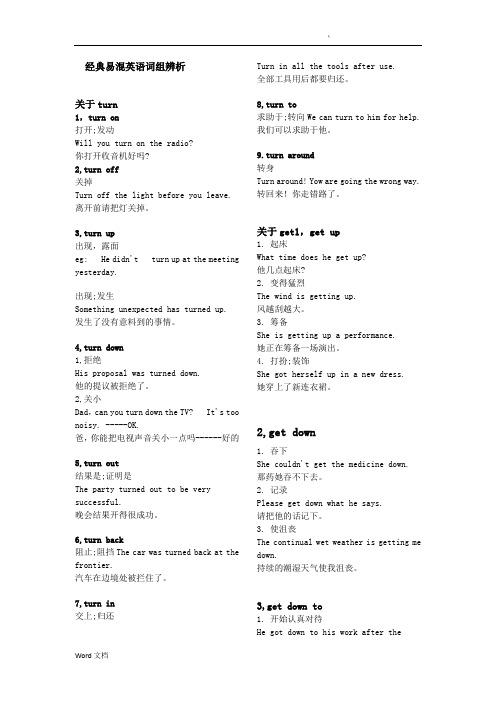
经典易混英语词组辨析关于turn1,turn on打开;发动Will you turn on the radio?你打开收音机好吗?2,turn off关掉Turn off the light before you leave. 离开前请把灯关掉。
3,turn up出现,露面eg: He didn't turn up at the meeting yesterday.出现;发生Something unexpected has turned up.发生了没有意料到的事情。
4,turn down1,拒绝His proposal was turned down.他的提议被拒绝了。
2,关小Dad,can you turn down the TV? It's too noisy. -----OK.爸,你能把电视声音关小一点吗------好的5,turn out结果是;证明是The party turned out to be very successful.晚会结果开得很成功。
6,turn back阻止;阻挡The car was turned back at the frontier.汽车在边境处被拦住了。
7,turn in交上;归还Turn in all the tools after use.全部工具用后都要归还。
8,turn to求助于;转向We can turn to him for help. 我们可以求助于他。
9.turn around转身Turn around! Yow are going the wrong way. 转回来!你走错路了。
关于get1,get up1. 起床What time does he get up?他几点起床?2. 变得猛烈The wind is getting up.风越刮越大。
3. 筹备She is getting up a performance.她正在筹备一场演出。
高中英语易混淆词辨析
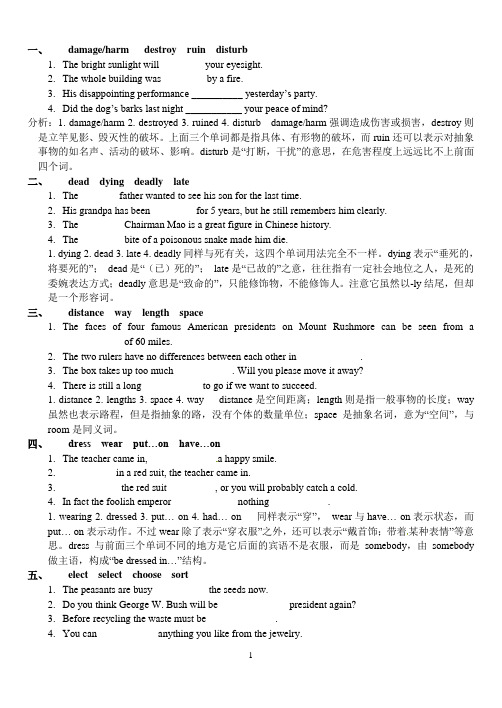
一、damage/harm destroy ruin disturb1.The bright sunlight will ________ your eyesight.2.The whole building was ________ by a fire.3.His disappointing performance __________ yesterday’s party.4.Did the dog’s barks last night ___________ your peace of mind?分析:1. damage/harm 2. destroyed 3. ruined 4. disturb damage/harm强调造成伤害或损害,destroy则是立竿见影、毁灭性的破坏。
上面三个单词都是指具体、有形物的破坏,而ruin还可以表示对抽象事物的如名声、活动的破坏、影响。
disturb是“打断,干扰”的意思,在危害程度上远远比不上前面四个词。
二、dead dying deadly late1.The _______ father wanted to see his son for the last time.2.His grandpa has been ________ for 5 years, but he still remembers him clearly.3.The ________ Chairman Mao is a great figure in Chinese history.4.The ________ bite of a poisonous snake made him die.1. dying2. dead3. late4. deadly同样与死有关,这四个单词用法完全不一样。
dying表示“垂死的,将要死的”;dead是“(已)死的”;late是“已故的”之意,往往指有一定社会地位之人,是死的委婉表达方式;deadly意思是“致命的”,只能修饰物,不能修饰人。
英语易混词语辨析

英语易混词语辨析
1.some一般用于肯定的陈述句中,any多用于否认句、疑问句或条件句中。
两者都可修饰可数名词,也可修饰不可数名词。
例如:There is some water in the cup.
Do you have any friends in Shanghai?
If you have any help, let me know.
2.在疑问句中有时也用some,表示希望得到肯定的答复或表示请求、建议、命令等含义。
例如:Would you like some more tea?
3.any也可以用在肯定陈述句中或条件状语从句中,表示任何的、任何一个的,其后接名词单数形式。
例如:Jim runs faster than any other student in his class.
1.few, a few修饰可数名词复数形式,little, a little 修饰不可数名词。
2.a few,a little有肯定含义,译作有几个,有一点;而few 和little表否认,译作没有几个,没有多少。
many, much和a lot of/lots of
都是许多的意思,many后接可数名词复数形式,much后接不可数名词,a lot of/lots of后接可数名词复数形式或不可数名词都可以。
each对两个或两个以上的人或物而言,侧重于个体,且可单独作主语、宾语等;every是对三个或三个以上的人或事物而言,侧重整体情况,且不能单独使用,只能做修饰词。
英语易混淆词辨析技巧
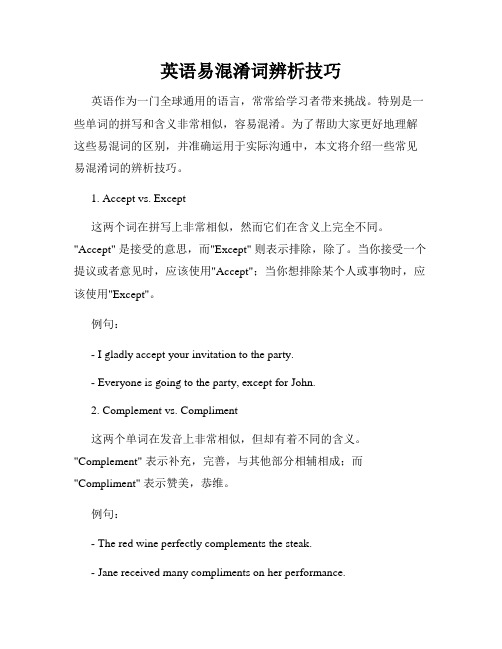
英语易混淆词辨析技巧英语作为一门全球通用的语言,常常给学习者带来挑战。
特别是一些单词的拼写和含义非常相似,容易混淆。
为了帮助大家更好地理解这些易混词的区别,并准确运用于实际沟通中,本文将介绍一些常见易混淆词的辨析技巧。
1. Accept vs. Except这两个词在拼写上非常相似,然而它们在含义上完全不同。
"Accept" 是接受的意思,而"Except" 则表示排除,除了。
当你接受一个提议或者意见时,应该使用"Accept";当你想排除某个人或事物时,应该使用"Except"。
例句:- I gladly accept your invitation to the party.- Everyone is going to the party, except for John.2. Complement vs. Compliment这两个单词在发音上非常相似,但却有着不同的含义。
"Complement" 表示补充,完善,与其他部分相辅相成;而"Compliment" 表示赞美,恭维。
例句:- The red wine perfectly complements the steak.- Jane received many compliments on her performance.3. Principal vs. Principle"Principal" 是一个名词,表示校长或主要负责人,也可以表示一笔资金的本金;而"Principle" 是一个名词,表示原则,信念或规则。
例句:- The principal of the school greeted the students in the morning.- Honesty is an important principle to live by.4. Advise vs. Advice这两个词都和建议有关,然而它们是不同的词性。
英语易混词辨析大全(附带例句解析)
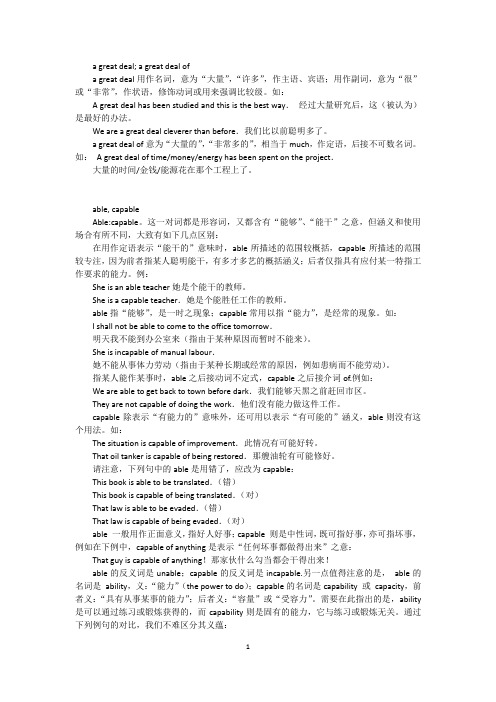
a great deal; a great deal ofa great deal用作名词,意为“大量”,“许多”,作主语、宾语;用作副词,意为“很”或“非常”,作状语,修饰动词或用来强调比较级。
如:A great deal has been studied and this is the best way.经过大量研究后,这(被认为)是最好的办法。
We are a great deal cleverer than before.我们比以前聪明多了。
a great deal of意为“大量的”,“非常多的”,相当于much,作定语,后接不可数名词。
如:A great deal of time/money/energy has been spent on the project.大量的时间/金钱/能源花在那个工程上了。
able, capableAble:capable。
这一对词都是形容词,又都含有“能够”、“能干”之意,但涵义和使用场合有所不同,大致有如下几点区别:在用作定语表示“能干的”意味时,able所描述的范围较概括,capable所描述的范围较专注,因为前者指某人聪明能干,有多才多艺的概括涵义;后者仅指具有应付某一特指工作要求的能力。
例:She is an able teacher她是个能干的教师。
She is a capable teacher.她是个能胜任工作的教师。
able指“能够”,是一时之现象;capable常用以指“能力”,是经常的现象。
如:I shall not be able to come to the office tomorrow.明天我不能到办公室来(指由于某种原因而暂时不能来)。
She is incapable of manual labour.她不能从事体力劳动(指由于某种长期或经常的原因,例如患病而不能劳动)。
指某人能作某事时,able之后接动词不定式,capable之后接介词of.例如:We are able to get back to town before dark.我们能够天黑之前赶回市区。
- 1、下载文档前请自行甄别文档内容的完整性,平台不提供额外的编辑、内容补充、找答案等附加服务。
- 2、"仅部分预览"的文档,不可在线预览部分如存在完整性等问题,可反馈申请退款(可完整预览的文档不适用该条件!)。
- 3、如文档侵犯您的权益,请联系客服反馈,我们会尽快为您处理(人工客服工作时间:9:00-18:30)。
高考英语易混易错词汇总结(一)编稿:李俊和审稿:毕勤责编: 隋瑜1. clothes, cloth, clothingclothes统指各种衣服,谓语动词永远是复数, cloth指布,为不可数名词 clothing 服装的总称,指一件衣服用a piece of, an article of2. incident, accidentincident指小事件, accident指不幸的事故He was killed in the accident.3. amount, numberamount后接不可数名词, number后接可数名词 a number of students4. family, house, homehome 家,包括住处和家人,house房子,住宅,family家庭成员. My family is a happy one.5. sound, voice, noisesound自然界各种各样的声音,voice人的嗓音,noise噪音I hate the loud noise outside.6. photo, picture, drawingphoto用照相机拍摄的照片,picture可指相片,图片,电影片,drawing画的画 Let's go and see a good picture.7. vocabulary, wordvocabulary词汇,一个人拥有的单词量,word具体的单词He has a large vocabulary.8. population, peoplepopulation人口,人数,people具体的人 China has a large population.9. weather, climateweather一天内具体的天气状况,climate长期的气候状况 The climate here is not good for you.10. road, street, path, wayroad具体的公路,马路,street街道,path小路,小径,way道路,途径take this road; in the street, show me the way to the museum.11. course, subjectcourse课程(可包括多门科目),subject科目(具体的学科)a summer course12. custom, habitcustom传统风俗,习俗,也可指生活习惯,后接to do, habit生活习惯,习惯成自然,后接of doing. I've got the habit of drinking a lot.13. cause, reasoncause 指造成某一事实或现象的直接原因,后接of sth./doing sth,reason用来解释某种现象或结果的理由,后接for sth./doing sth. the reason for being late14. exercise, exercises, practiceexercise运动,锻炼(不可数),exercises练习(可数),practice(反复做的)练习 Practice makes perfect.15. class, lesson作"课"解时,两者可以替换.指课文用lesson. 指班级或全体学生用class. lesson 6; class 516. speech, talk, lecturespeech指在公共场所所做的经过准备的较正式的演说,talk日常生活中的一般的谈话,讲话,lecture学术性的演讲,讲课 a series of lecture on…17. officer, officialofficer部队的军官,official政府官员 an army officer18. work, job二者均指工作。
work不可数,job可数 a good job19. couple, paircouple主要指人或动物,pair多指由两部分组成的东西 a pair of trousers20. country, nation, state, landcountry侧重指版图,疆域,nation指人民,国民,民族,state侧重指政府,政体,land 国土,国家 The whole nation was sad at the news.21. cook, cookercook厨师,cooker厨具 He is a good cook.22. damage, damagesdamage不可数名词, 损害,损失; damages复数形式, 赔偿金 $900 damages23. police, policemanpolice警察的总称,后接复数谓语动词,policeman 指某个具体的警察 The police are questioning everyone in the house.24. problem, questionproblem常和困难连系,前面的动词常为think about, solve, raise, question多和ask, answer连用25. man, a manman人类,a man一个男人 Man will conquer nature.26. chick, chicken二者均可指小鸡,chicken还可以当鸡肉 The chicken is delicious.27. telegram, telegraph当电报解时,telegram指具体的,telegraph指抽象的 a telegram, by telegraph28. trip, journey, travel, voyagetravel是最常用的,trip指短期的旅途,journey指稍长的旅途,voyage指海上航行 a three-day trip29. sport, gamesport多指户外的游戏或娱乐活动,如打球,游泳,打猎,赛马等;game指决定胜负的游戏,通常有一套规则 His favorite sport is swimming.30. price, prizeprice价格,prize奖,奖品,奖金 win the first prize , The price is high/low.31. a number of, the number ofa number of许多,谓语动词用复数。
the number of…的数目,谓语动词用单数。
The number of students is increasing.32. in front of, in the front ofin front of范围外的前面,in the front of范围内的前面 In the front of the room sits a boy.33. of the day, of a dayof the day每一天的,当时的,当代的, of a day暂时的,不长久的 a famous scientist of the day34. three of us, the three of usthree of us我们(不止三个)中的三个,the three of us我们三个(就三个人)The three of us---Tom, Jack and I went to the cinema.35. by bus, on the busby bus表手段,方式,不用冠词,on the bus表范围 They went there by bus.36. for a moment, for the momentfor a moment 片刻,一会儿,for the moment暂时,一时 Thinking for a moment, he agreed.37. next year, the next yearnext year将来时间状语,the next year过去将来时间状语 He said he would go abroad thenext year.38. more than a year, more than one yearmore than a year一年多,more than one year超过一年(两年或三年等)39. take advice, take the(one's) advicetake advice征求意见,take the advice接受忠告 He refused to take the advice and failed again.40. take air, take the airtake air传播,走漏,take the air到户外去,散步 We take the air every day.41. in a word, in wordsin a word总之,一句话, in words口头上 In a word, you are right.42. in place of, in the place ofin place of代替,in the place of在…地方A new building is built in the place of the old one. 在旧楼的地方建造了新楼。
Plastics can be used in place of wood. 塑料可以用来代替木材。
43. in secret, in the secretin secret秘密地,暗自地,偷偷地,一般用作状语;in the secret知道内情,知道秘密,一般用作表语 My mother was in the secret from the beginning.44. a girl, one girla girl可泛指所有女孩, one girl一个女孩 Can one girl carry such a big box?45. take a chair, take the chairtake a chair相当于sit down坐下,take the chair开始开会46. go to sea, by sea, by the seago to sea当海员,出航,by sea乘船,由海路, by the sea在海边47. the doctor and teacher, the doctor and the teacherthe doctor and teacher指一个人,既是医生又是老师,the doctor and the teacher两个人,一个医生和一个老师 the doctor and teacher is48. in office, in the officein office在职的,in the office在办公室里 He is in office, not out of office.49. in bed, on the bedin bed卧在床上,on the bed在床上 The book is on the bed. He is ill in bed.50. in charge of, in the charge ofin charge of管理,负责照料, in the charge of由……照料 He is in charge of the matter. The matter is in the charge of her.51. in class, in the classin class在课上,in the class在班级里 He is the best student in the class.52. on fire, on the fireon fire着火,on the fire在火上 Put the food on the fire. The house is on fire.53. out of question, out of the questionout of question毫无疑问的,out of the question不可能的54. a second, the seconda second又一,再一,the second第…… He won the second prize.55. by day, by the dayby day白天,by the day按天计算 The workers are paid by the day.56. the people, a peoplethe people指人,a people指民族 The Chinese is a peace-loving people.57. it, oneit同一物体,one同类不同一 I lost my pen. I have to buy a new one.58. that, thisthat指代上文所提到的,this导出下文所要说的I was ill. That's why…59. none, nothing, no onenone强调有多少,nothing, no one强调有没有,nothing指物,no one指人--- How many…/How much…? --- None.60. anyone, any oneanyone指人,不能接of,any one指人物均可,可接of , any one of you61. who, whatwho指姓名或关系,what指职业或地位 What is your dad? He is a teacher.62. what, whichwhat的选择基础是无限制的,which在一定范围内进行选择 Which do you prefer, bananas or apples?63. other, anotherother后接名词复数,another后接名词单数 other students, another student64. not a little, not a bitnot a little非常,not a bit一点也不 I'm not a bit tired. 我一点儿也不累。
